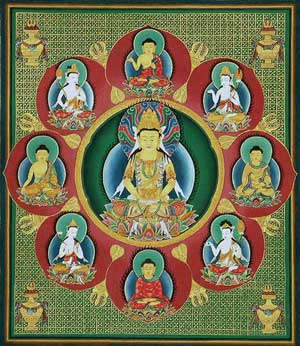Perhaps one of my least favorite questions is, “On a scale of 1 to 10, what’s your pain level today?” (I’m not the only one, it seems.)
In my years of seeking medical help for a mysterious chronic illness, I was repeatedly asked to quantify my pain. I struggled to confine the enormity of my fear, speculation, and daily fluctuations of symptoms into a single number. It felt like taking a symphony, with its ins and outs, crescendos and moods, and giving it a number. Go ahead, what number would you give Beethoven’s 5th?
Like a car owner taking his sedan to the shop, I lugged my aching, fearful body from one medical office to the next. I met very smart people, some of whom helped me, but I also met healthcare professionals who were clearly uncomfortable with the fact that my symptoms didn’t fit in a box. Once, a pain management specialist at Mount Sinai told me I wasn’t getting better because I wasn’t trying hard enough. I needed to work through the pain. At that time, my girlfriend had to fill out my intake chart because I couldn’t hold a pen.

I feel it necessary to say that I met exceptionally kind, intelligent, and generous doctors who helped me recover. Yet as I met more people dealing with serious medical conditions, I found I wasn’t alone in having alienating and confounding interactions with highly educated (and paid) medical professionals. I recently spoke with Irini Rockwell, who related this story about a family member suffering from an autoimmune condition.
“I went with her to an appointment with a nephrologist. She was talking about how tired and dysfunctional she was. As she was living with me at the time, I saw firsthand that she was dysfunctional maybe 80 percent of the time. She was explaining this to the nephrologist who was looking at reports of her test on his computer screen. Then he turned to her and looked her straight in the eye and said, ‘Well, you shouldn’t be feeling this way. Maybe you should see a psychologist or psychiatrist.'”
I first contacted Irini Rockwell, a psychotherapist, Buddhist teacher, and leadership consultant, because of a book she wrote which changed the way I think about the doctor/patient relationship. Her book, The Five Wisdom Energies: A Buddhist Way of Understanding Personalities, Emotions, and Relationships, offers a framework for understanding why certain personalities and relationships either make us feel valued and inspired or triggered and demoralized.
Rockwell writes that these five “wisdom energies” are fundamental to who we are. If understood and utilized, they can be a source of growth and healing. If ignored or suppressed, we likely suffer and create discord with others. In her words, here are the five wisdom energies.
The Five Wisdom Energies in Brief
• The vajra family reflects a blue energy like a crystal-clear mirror. Vajra energy reflects what it sees without bias; this is its wisdom quality. It also has a self-righteousness that can harden into cold or hot anger; that is its confused quality.
• The ratna family exudes a rich and earthy golden yellow energy that encompasses everything. The wisdom quality of ratna energy is richness, equanimity, and satisfaction. But it can also turn into greedy territoriality and puffed-up pride, which is its neurotic quality.
• The padma family glows with the vitality of red energy. Padma energy’s passion is, at its best, compassionate wisdom. At its neurotic worst, it manifests as grasping attachment. In its wisdom it is finely tuned in to what is happening, discriminating experience without bias. However, when it is neurotic, it can cling obsessively to what gives pleasure.
• The karma family emits a green energy, swift and energetic like the wind. Karma energy is all-accomplishing action for the benefit of others; this is its wisdom quality. It can also become power-hungry, manipulative, competitive, and envious; that is its confused quality.
• The buddha family radiates a white energy, spacious and peaceful. Buddha energy is an all-pervasive, peaceful space; this is its wisdom quality. It can also be solidly immobile with the density of ignoring or denying; that is its confused quality.
Why the Medical Profession Is Largely Vajra-Karma
Reading The Five Wisdom Energies had me thinking about my own experience seeing dozens of healthcare providers and receiving a myriad of tests and treatments. I was grateful for the access to healthcare, but the more I went through this medical journey, the less I felt like a whole person. I often felt like it was all about what was wrong with me and what the next “action” would be.
I began to wonder whether vajra and karma energies were overemphasized in our modern healthcare system. In a conversation earlier this year, Rockwell concurred:
“My experience is that the Western medical profession is male dominated and the two energies that are more masculine are vajra (blue) and karma (green). We train doctors who are super smart people to become super smart clinicians. Their mental acuity can be brilliant in terms of theoretical and practical knowledge. And then we say, okay, treat patients. Their goal is to diagnose and fix it. You gotta fix it. But often that is not what is needed in the moment. The professional/patient relationship becomes very vajra-karma and there’s no, or very little, personal resonance; what we used to call a bedside manner…. Obviously there are exceptions.”
How to Break Out Of the Cycle
Here’s how I drew on two wisdom energies to improve my interactions with medical professionals.
1. Buddha: “Spacious and peaceful.” Navigating our medical system often means having to make many decisions. I give myself time and space to process both the actual consequences of any choice as well as my own emotional reactions. In concrete terms, I feel my breath and body in the waiting room and then in the doctor’s office. Afterwards, I take a quick walk and see the open sky to remind me of a bigger perspective.
2. Padma: “Compassionate wisdom.” I try to be gentle with myself, realizing that both I and this doctor just want to be happy and that we are both likely overwhelmed and overworked.
Rockwell says there’s one key to using the five wisdom energies:
“Maitri is a Sanskrit word which means unconditional lovingkindness, to the good, the bad, and the ugly within us. In my book, I unpack maitri, and talk about it in terms of familiarity. ‘Okay, I’m beating myself up again. Relax, be gentle and kind.’ We need to be brave to be kind. We take a deep breath in and breathe out and we are just there with this warm loving quality, and embracing ourselves. Maitri is the catalyst that transforms our confusion into wisdom.”
“Maitri is the antidote to what I think is pervasive in our society: a sense of original sin. We tend to ally ourselves with a sense of basic badness rather than a sense of basic goodness in ourselves. The sense of basic badness becomes very solidified. However, the truth is there is no basic badness; what is basic is that we are good, kind, and loving people. What we experience is our neurosis or badness is just a stain; it’s removable.”
Don’t Take It Personally
Rockwell told me:
“When you meet a doctor who’s very vajra-karma, it’s very helpful to say, ‘Yes, that’s where he or she is.’ Try not take it personally. If someone is very solidly in a particular energy, they just don’t have the capacity to include other energies. They haven’t expanded their palette of permissible energy. So it’s really just helpful to say, ‘Okay, with this doctor I can get some intelligence but this isn’t going to be my unconditionally loving caretaker.’”
Irini Rockwell is the author of The Five Wisdom Energies: A Buddhist Way of Understanding Personalities, Emotions, and Relationships and the founder, director and principle trainer of Five Wisdoms Institute and Wisdom@Work. You can learn more about her ongoing work here.
~
Relephant Favorite:
The Five Buddha Families.
~
Author: Dan Cayer
Editor: Travis May
Photo: Wikipedia, Author’s Own







Read 3 comments and reply